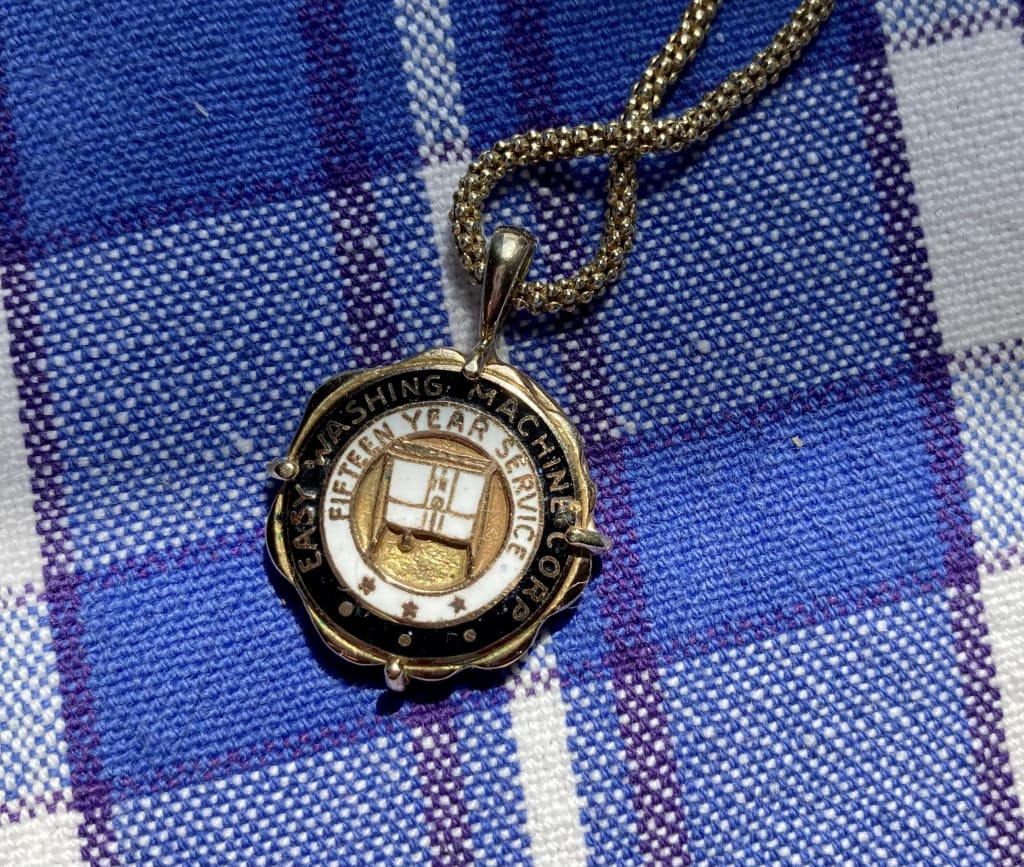
This week began with Labor Day which always puts my mind on my father. Dad earned the nickname “Brain” because, had he not been born into a poor family just at the edge of the Great Depression, his intelligence might have led to a very different life than the one he lived. He had to drop out of school after eighth grade to go to work in order to help support his mother and father. He found a job at the Easy Washer plant in Syracuse, NY. I know he worked there for at least 15 years, beginning when he was thirteen. Easy Washer made wringer washing machines. I also know that he worked there right through WWII, doing essential war work.
After the war, my father’s plant was folded into General Electric. He had taught himself all about electrical circuits and even learned higher math skills, algebra and calculus, through home correspondence courses. For the rest of his life, until he retired, he worked in the TVR section of GE where assembly lines turned out the first televisions, whose guts consisted of an array of cathode tubes. Televisions were small and heavy and changed over time from black and white to color sets. He knew how each tube functioned in the TV and he purchased tubes which he kept in his basement workshop where he fixed our neighbors’ televisions and radios.
General Electric had a very active union, AFL-CIO, and my father became a union steward. Management was never fond of unions. Unions turned workers into a powerful bargaining unit. Often unions fought to force management to stop encroaching on rights that workers had already won. It was common to force workers to work hours of overtime after a full shift by threatening to replace workers who said “no” to extra hours. Whenever a worker had a grievance, they could ask the union to put the power of numbers behind the rather puny efforts of one worker in order to right a wrong. Of course, sometimes unions overstepped also, and used their power to force the company to keep workers who were slackers, or who stirred up disagreements with fellow workers. Unions often stood up for workers in cases of discrimination, but not always as often as they should have.
A pattern was set up in the minds of workers, that anyone hired into a factory like GE would work there for his or her entire life and would retire from there one day in their old age. There were no health care plans, no retirement plans, no unemployment insurance, no social security, but there supposedly was the sense that you had joined a family and if you ‘pulled your weight’ you would keep your job for a lifetime. Gradually the federal government began to offer programs to help workers with retirement and unemployment.
My father and the union workers at GE went on strike many times to win higher wages as the American economy began to grow and inflation kicked in. Often, they were offered benefits in place of higher wages. Probably half of our family’s eight children had left home before the company offered health care and retirement savings programs. Workers did not get paid while they were out on strike, and some strikes were lengthy. The union gave striking families stipends which kept them from starvation but caused wage earners much anxiety about other costs like mortgage payments, clothing for their children for school, other school costs, and the costs of keeping a car on the road. Our family seemed to live in waves of feast and famine.
Capitalism is an economic system which encourages private ownership of a business paired with the sale of items in a marketplace to consumers who keep the owner in business. Since businesses are run by people and people have flaws like greed, or a single-minded drive to succeed at the cost of employees, corporations are as corrupt as their owners. Businesses must please stockholders and boards of directors when they become large corporations. When money seems pinched or the market wobbly, workers without unions could face unreasonable work demands from these large corporation, where the work force was basically faceless to the owners. Unions filled an essential role.
But, a fact of our lives is that life moves on, sometimes at a fast pace, sometimes slowly. Promises made for a lifetime may not be kept if conditions change and the world after WWII saw many changes. In 1960 SONY introduced the first solid state television sets. These sets did not use tubes. The technology was new, and my father was unprepared for it. But he did not make televisions by that time. He worked in the “Master Oscillator” room checking instruments and keeping records.
By the time he was thinking about retirement he still had four children at home who were in high school. He could not retire yet. GE encouraged him to leave by putting him back on the main assembly line. He was anxious all the time and the assembly line pressures disturbed his sleep at night. Soon television production was no longer profitable for GE in Syracuse, and the company decided to move their TV operations to another city.
Southeast Asia was producing more and more televisions and they wereless expensive for consumers to buy. The marketplace was changing, and unions were also caught off guard. They did not understand that they were competing against a foreign labor force that could be paid far less than American workers were being paid. Unions kept asking for higher wages. Corporations like to say that the unions pushed them to go overseas. However, corporations go where their bottom line is best served, where their profit margins are best, where consumers are hungry for the goods they produce.
Once the USSR came apart in 1981 and businesses in China began to take off in the 1980’s, corporations rushed to fill a factory vacuum in countries that offered a seemingly endless supply of cheap labor. The unions may not have seen the handwriting on the wall, but the corporations did, and they leaped across oceans to seize the opportunities presented. American companies declared bankruptcy, leaving their employees without their pensions. Finally, the federal government had to step in and offer some recompense to workers left high and dry after years of labor. The labor market in America changed drastically causing the grievances that right-wing talk show hosts inflamed.
Now we have people who must work two or three low-wage jobs and still cannot pay for all their needs. We have something called ‘gig workers’ whatever that is. We have more entrepreneurs which is not necessarily a bad thing, but our small businesses are less stable than those large corporations once were. And we have a pandemic which has led to interruptions in supply chains. The American economy seems poised to recover but is being held back by partisan fights over commonsense health initiatives.
As companies joined the Great Factory Migration, we saw a right-wing push to make unions obsolete by passing laws called ‘right to work’ laws, which is meant to put a positive spin on something that is not positive at all. Unions charged nonunion workers a fee although they were not members because it made the union more powerful and allowed the unions to win more battles with management. Workers resented these fees, but they also received the same hard-won benefits that union members received when the fight was over. Pressure from the right-wing to pass right-to-work laws included the use of strategies that escalated the anger already present in nonunion workers about having to help pay for union negotiations.
Unions may seem like archaic vestiges of a former age right now, but I would not give up on all that employee empowerment so quickly. Workers still need to band together to keep from giving management free reign over its worst impulses. There are many rights that workers still need in America, rights that workers have in other nations. Workers still must choose between family and employers when emergencies arise. Workers must choose between childcare and work, and this often affects female workers most, although men actually have children too, and there are few if any choices offered for men who might choose to be a childcare provider.
My dad was forced into early retirement when his skill set no longer matched what was needed in a company that he thought had become his other family. He was fortunate to work for a company that did not have to declare bankruptcy. GE was able to keep its retirement promises to senior employees. Watching his skills become obsolete was still hard on my father and the strategy of putting senior workers back on the main assembly line where they were often too slow to keep up left him feeling abused, angry, and incompetent.
Spending a lifetime in the hire of a single corporation or employer is highly unlikely in today’s work climate. But I still pay my union dues, although I am retired. I hope that all union workers will keep paying dues to their unions if they can. We may need our unions again. Even Amazon employees are trying to unionize, so far without much success and some possible cheating on the part of management. Workers may all be replaced by robots, but it looks like that will not happen quite yet. People will still want to be productive and won’t want those Republicans to think of them as deadbeats. AI presents whole new challenges for workers. How soon this transition will happen no one knows. So, for now we need to keep our unions alive. We need to oppose right-to-work laws. CEO’s don’t run the world, workers do.






Comments
There are no comments for this story
Be the first to respond and start the conversation.